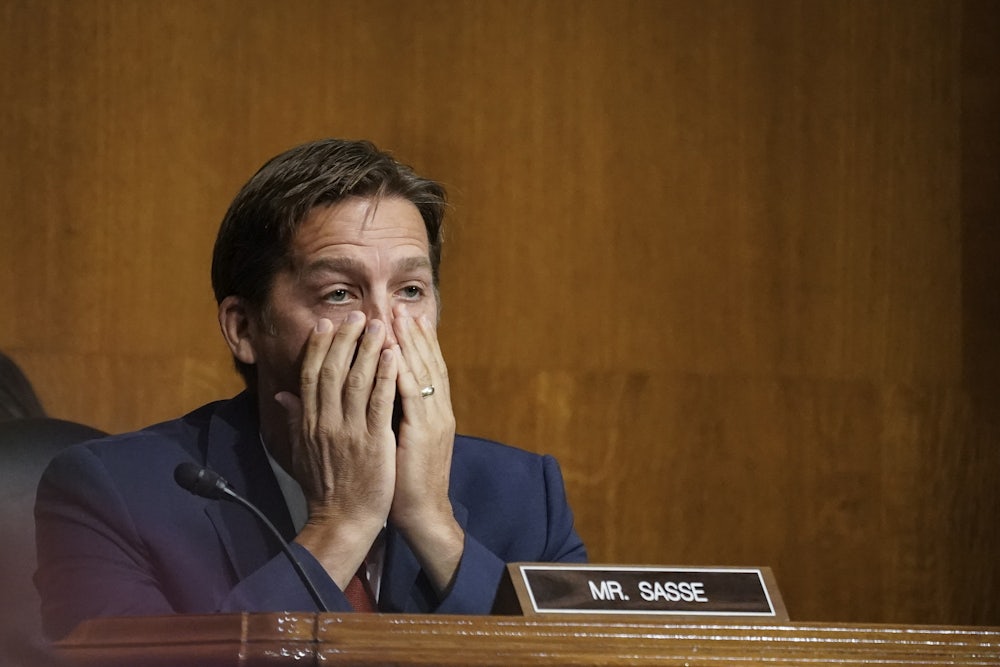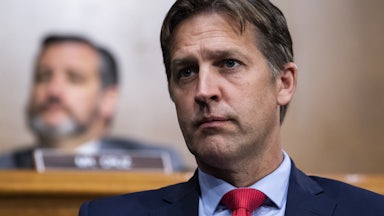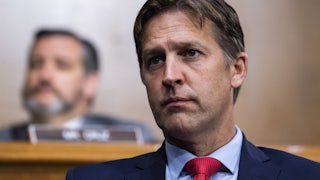Way back in March of 2016, Nebraska Senator Ben Sasse told the world that “if the Republican Party becomes the party of David Duke, Donald Trump—I’m out.” Two years later and still very much “in,” Sasse claimed that he continued to consider leaving the GOP “every morning.” “I, Lucius Malfoy, Have Regularly Considered Leaving the Death Eaters,” came a McSweeney’s riposte.
This year, Sasse finally decided that it’s quitting time. But instead of leaving the GOP (that might take some real courage), he’s opted out of organized politics itself—and into a nearly $1 million salary bump. In early October, Sasse announced that he planned to resign from the Senate at the end of the year instead of riding out the final four years of his second term, capping an eight-year tenure in the legislative body. Come February, he’ll decamp for the Sunshine State, where, following a controversial vetting process, he’ll take over as the next president of the University of Florida. What will the country remember of the political career of “Liddle Ben Sasse,” a man so eminently forgettable even Jeopardy wizard James Holzhauer couldn’t name him?
During the Trump years, media coverage of Sasse tended to emphasize two core qualities. The first was his frequent criticism of the former president and his MAGA acolytes. In an Atlantic column following the January 6 attack, for example, Sasse somewhat lamely called Marjorie Taylor Greene “cuckoo for Cocoa Puffs.” (No doubt she felt stung by such a cutting remark.)
But for all his quips and quibbles, Sasse’s actual record told a different story. He voted in line with Trump’s position 85 percent of the time—just a point or two behind reliable Trumpist lickspittles such as Josh Hawley, Ron Johnson, and Lindsey Graham. Sasse epitomized this slippery two-step during Brett Kavanaugh’s confirmation process, during which time he criticized Trump for making fun of Christine Blasey Ford, called the #MeToo movement an “important and a needed development,” lamented that the U.S. suffers from a “culture of sexual assault,” and then, to no one’s surprise, voted to confirm Kavanaugh anyway.
Sasse’s second oft-emphasized quality is his elite pedigree—Harvard bachelor’s, St. Johns master’s, Yale history doctorate—which endeared him to those swaths of the commentariat who were perpetually seeking a “reasonable Republican” foil that might draw a favorable contrast with Trump’s crass ignorance.* Trump spends his waking hours glued to Fox News; Sasse homeschools his kids in a “family canon” and does “By the Book” interviews with The New York Times.
Sasse’s sycophantic fanboys in the pundit camp were all willing to look past the way the senator’s own grasp on history was hardly by the book. In 2018, Sasse was widely mocked after he tweeted, “The difference between America and most nations across history is that we use persuasion instead of violence.” His latest book, Them: Why We Hate Each Other—and How to Heal, also includes some howlers, especially when he attempts to mine the civil rights movement for historical insight. “Americans didn’t embrace civil rights as a legal matter first but rather as a right and proper way to respect the dignity of other individuals,” Sasse argues, writing that the chief lesson of Martin Luther King Jr.’s legacy is that “deep, enduring change does not come through legislation or elections.” Seriously? What does Sasse think the March on Washington was for? Good vibes? Sasse wields this historical distortion to arrive at the book’s argument for what we don’t need to solve the country’s present ills: “Ultimately, it’s not legislation we’re lacking.” A strange conclusion coming from a sitting senator.
But it’s in his books where Sasse shows his true colors. In addition to Them, Sasse is the author of The Vanishing American Adult: Our Coming of Age Crisis—and How to Rebuild a Culture of Self-Reliance, which came out in 2017. At their core, both books are essentially arguments against politics, full of plangent lamentations of the putative “division” and “tribalism” of American life, “kids these days” clucking, and calls for embracing a traditional work ethic and family structure.
In a review of Sasse’s books following his announced departure from the Senate, New York Times book critic Carlos Lozada deemed Them “a generic, forgettable work.” It’s an assessment that could easily double as a summation of Sasse’s political career. Them ends with Sasse calling on Americans to put less stock in politics and enjoy more time with their families and neighbors. On its own, this message is merely trite, but it reached absurd proportions during a speech Sasse gave just hours after the January 6 attack, when, with blood still spilled on the Capitol floor, he encouraged Americans to respond to an attempted insurrection by offering to “shovel somebody’s driveway.”
To those Americans too ignorant take his advice and stop caring so much about politics, Sasse tends to respond with snide and sometimes sexist condescension. After receiving a slew of calls from angry voters following his early and enthusiastic support for Trump education secretary Betsy DeVos, whom he called an “excellent pick” and “powerful advocate for poor students,” Sasse dismissed their concerns as “shrill Boogeyman ideas of what she supposedly represents.” And early in the Kavanaugh Senate hearings, Sasse derided the “hysteria” of “screaming protesters saying women are going to die” if the Supreme Court overturned Roe. (Researchers at the University of Colorado recently found that under a nationwide abortion ban, maternal deaths would increase by 24 percent overall and 39 percent for Black women in particular.)
As is so often the case among Beltway elites, Sasse will be leaving Washington by means of a golden parachute. In October, Sasse was named the sole finalist to be the next president of the University of Florida, following a presidential search conducted with little transparency. His first visit to Gainesville drew strident protests, with students emphasizing his opposition to gay marriage and abortion rights. Nonetheless, Sasse was confirmed unanimously by the U.F. board of trustees weeks later, in a building where students were barred from protesting.
What is Sasse’s vision for the university? In a brief and vacuous statement, Sasse wrote that U.F. “is uniquely positioned to lead this country through an era of disruption,” which requires “new institutions and entrepreneurial communities” and a “dynamic, bold, future-oriented oriented university.” All this is of a piece with Sasse’s previous academic job as president of Midland University, a tiny school in Nebraska, where he worked from 2009 to his election to the Senate in 2014. As Malcolm Harris noted in these pages several years ago, Sasse’s tenure at Midland was drawn “straight out of the corporate consultant playbook” (Sasse’s first professional jobs were at Boston Consulting Group and McKinsey.) He “rebranded Midland Luther College as Midland University, swallowed up half the students from a nearby de-licensed for-profit college, survived his own close call with the licensing board, invested in sports and a business program, and changed the school colors.”
None of this bodes well for Sasse’s tenure at U.F., which is facing an onslaught from Florida Governor Ron DeSantis and the state’s Republican legislature. Sasse greeted his new job as an “opportunity to step back from politics.” But to paraphrase Trotsky, while Sasse might not be interested in politics, but politics is certainly interested in him. So far, Sasse has largely feigned ignorance about DeSantis’s attempts to undermine academic freedom and wage war on educators in the state. But the U.F. student newspaper did report that during Sasse’s tenure at Midland, faculty were allegedly forced to sign a loyalty oath, promising not to speak ill of Sasse or the university. And if Sasse’s relationship with Trump offers any clue for where things might go, we can expect little serious resistance to DeSantis’s efforts to make Florida “where woke goes to die”—with wokeness defined, according to DeSantis’s general counsel, as “the belief there are systemic injustices in American society and the need to address them.”
Addressing systemic injustices requires political solutions. So it’s fitting that Sasse, the consummate anti-politics politician, is our 2022 Quitter of the Year. But even that distinction has a ring of falsity to it. You can only quit something when you had some skin in the game to begin with.
* This article originally misidentified the university from which Sasse obtained his Master’s degree.










